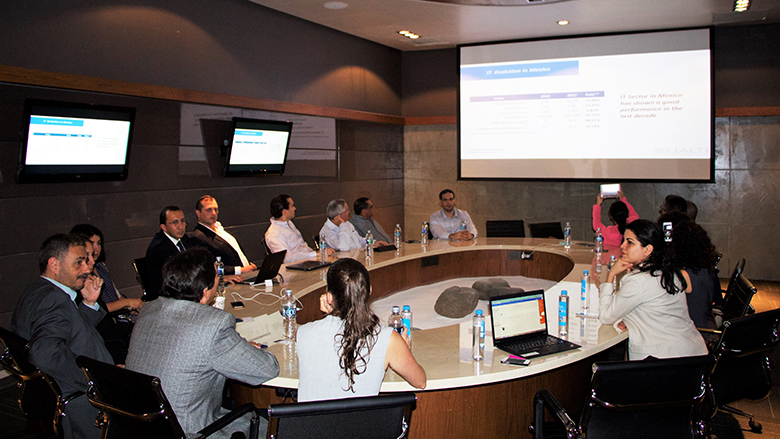The Information-Technology Development Project took shape in response to the 2006 request from the Mexican government to help it develop the nation’s IT industry through its Program for the Development of the Software Industry (PROSOFT), which was launched in 2004 to promote growth and create jobs in information technology and information technology–enabled services (IT/ITES). The project was one element of the government´s broader plan to invest roughly US$ 250 million in PROSOFT, with a strategy focused on expanding the number of jobs in the IT industry, addressing several critical human skills deficits, linking Mexican companies with multinational corporations, engaging in regulatory reform, and developing solutions for financing IT companies.
To help the IT/ITES industry ramp up and compete globally, the project created MexicoFIRST, a training institution focused on increasing the quantity and quality of its skilled IT workers through training grants for technical, managerial, and English courses; certifications; seminars and workshops for faculty, students, and industry professionals; and recruitment outreach for the IT industry.
The project’s industry-driven design relied on continuous dialogue with industry clusters and private companies to quickly address any gaps and/or identify new trends. Direct collaboration with the IT industry (including academia) to identify, prioritize, and propose many of the project activities, endorsed by the state governments, helped ensure the interventions’ relevance. The World Bank’s convening power, moreover, allowed the creation of an International Consultative Commission, which confirmed project activities were consistent with global IT industry trends.
Results
MexicoFIRST. MexicoFIRST has become the main provider of training grants for the country’s IT industry. Among its specific achievements are the following:
MexicoFIRST has become the main provider of training grants for the IT industry in the country, providing over 80,000 university students with courses, and has successfully bridged the talent gap between graduate capabilities and employer demands.
- A total of 102,527 trainees received international standard certifications.
- Approximately 40,000 students moved on to new jobs in the IT industry after attending MexicoFIRST training programs.
- Surveys from participating students show that they credit MexicoFIRST for their ability to find new and satisfying work.
- MexicoFIRST trainees who had already worked in IT-related jobs reported receiving better salaries and promotions following the training.
PROSOFT. PROSOFT’s contributions to strengthening Mexico’s IT industry include the following:
Approximately 700 companies received consulting and certification in IT international quality standards, improving their ability to compete in the global market.
Eight hundred public officials were trained on IT Sector Legal Framework, improving their capabilities to enhance an enabling environment contributing to increased IT industry competitiveness.
One hundred companies participated in the Financing IT accreditation program, spurring access to finance. IT companies’ debt portfolios in the financial system grew to US$ 47.2 million from the baseline of US$ 5.8 million.
Fifteen government entities received training and studies on the feasibility of outsourcing government services, a process that allowed Mexican IT firms to acquire experience in providing government services, thus increasing their competitiveness in offering their services in the public sector.
Accessiblity. The MexicoFIRST program was designed to be affordable and accessible, with the following results:
- The MexicoFIRST program demonstrated an impressive rate of return to graduates.
- Economies of scale were leveraged to offer training at 30 percent less on average than market rates for similar training programs by negotiating prices in bulk directly with international certification providers.
- A program impact evaluation undertaken by the Mexican government found that for half of those certified, a price increase of just Mex$ 30,000 (about US$ 1,730) would have made the training unaffordable.
- Certified students estimated they made back the cost of their training investment in approximately nine months, thanks to promotions and raises.
Bank Group Contribution
The World Bank, through the International Bank for Reconstruction and Development, provided a loan in the amount of US$ 80 million to finance this Information Technology Development Project.
Partners
Partners contributing to the successful outcomes of this project included: the Ministry of Economy, which provided strong technical and administrative leadership for the project’s design and implementation within a context of complexity and multiple stakeholders; Nacional Financiera and the Ministry of Finance, both of which were highly collaborative, facilitating implementation and taking remedial action when needed; the National Chamber of the Electronics of Telecommunications and Information Technologies, as well as the Mexican Information Technologies Industry Association for active participation in project discussions to ensure trainings met industry needs; and state promotion agencies (notably in Mexico City, Jalisco, Nuevo León, Aguascalientes, Queretaro, Hermosillo, and Tabasco) endorsed and supported the states’ industry projects.
Beneficiaries
IT companies and IT professionals generally, as well as students pursuing IT-related degrees, constituted the main beneficiaries of the project intervention. One example is Medisist, a 15-year-old company that sells healthcare research. Program training helped improve Medisist workers’ IT skills, resulting in growth, profit, and increased market share. With support from the project, Medisist invested in IT training and standardization that has led to improvements in its new software and consequently to expand customer satisfaction.
The Medisist management reports that the company is more competitive, and they hope to double the number of people Medisist employs from 60 to 120 within the next five years.
Moving Forward
After the project, MexicoFIRST remained operational, and several of its training activities have been recognized as good practices. South-to-South knowledge exchanges in 2014 and 2015 brought delegations from Jordan, Egypt, and Nicaragua to Mexico for study tours to learn more about the project. The approach used in the MexicoFIRST program is now a model for other countries, including Nicaragua and Bangladesh.
To continue driving the sector development, the Secretary of Economy launched PROSOFT 3.0 in July 2015. PROSOFT 3.0 identifies 15 potential sectors where effective introduction of IT services could contribute to improving the country’s economic productivity.
Learn More
Project Information Technology Development
Blog. Mexico first closing the training gap in the IT industry through public-private partnerships

